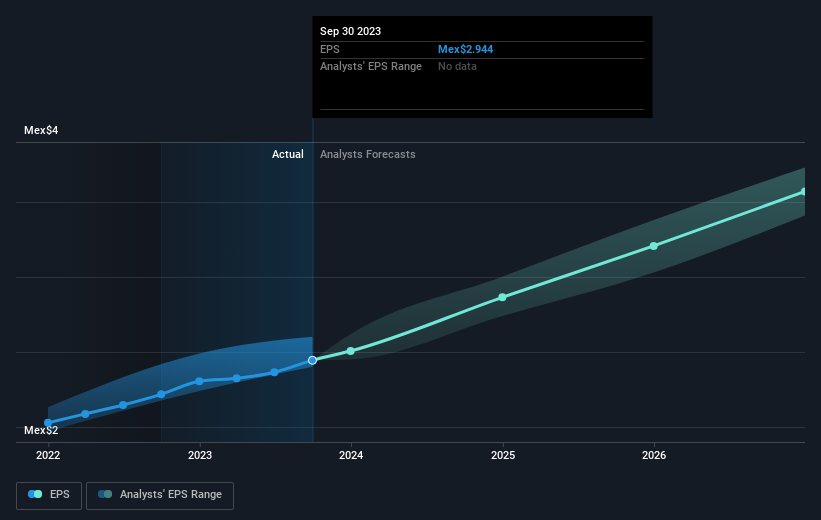- Mexico
- /
- Food and Staples Retail
- /
- BMV:WALMEX *
Wal-Mart de México. de (BMV:WALMEX) sheds 3.8% this week, as yearly returns fall more in line with earnings growth

Stock pickers are generally looking for stocks that will outperform the broader market. Buying under-rated businesses is one path to excess returns. To wit, the Wal-Mart de México. de share price has climbed 43% in five years, easily topping the market return of 26% (ignoring dividends).
Since the long term performance has been good but there's been a recent pullback of 3.8%, let's check if the fundamentals match the share price.
Check out our latest analysis for Wal-Mart de México. de
There is no denying that markets are sometimes efficient, but prices do not always reflect underlying business performance. One way to examine how market sentiment has changed over time is to look at the interaction between a company's share price and its earnings per share (EPS).
During five years of share price growth, Wal-Mart de México. de achieved compound earnings per share (EPS) growth of 7.7% per year. That makes the EPS growth particularly close to the yearly share price growth of 7%. That suggests that the market sentiment around the company hasn't changed much over that time. In fact, the share price seems to largely reflect the EPS growth.
The graphic below depicts how EPS has changed over time (unveil the exact values by clicking on the image).

Before buying or selling a stock, we always recommend a close examination of historic growth trends, available here.
What About Dividends?
As well as measuring the share price return, investors should also consider the total shareholder return (TSR). The TSR is a return calculation that accounts for the value of cash dividends (assuming that any dividend received was reinvested) and the calculated value of any discounted capital raisings and spin-offs. Arguably, the TSR gives a more comprehensive picture of the return generated by a stock. In the case of Wal-Mart de México. de, it has a TSR of 67% for the last 5 years. That exceeds its share price return that we previously mentioned. This is largely a result of its dividend payments!
A Different Perspective
Wal-Mart de México. de shareholders are down 4.0% for the year (even including dividends), but the market itself is up 3.6%. Even the share prices of good stocks drop sometimes, but we want to see improvements in the fundamental metrics of a business, before getting too interested. Longer term investors wouldn't be so upset, since they would have made 11%, each year, over five years. If the fundamental data continues to indicate long term sustainable growth, the current sell-off could be an opportunity worth considering. Is Wal-Mart de México. de cheap compared to other companies? These 3 valuation measures might help you decide.
Of course Wal-Mart de México. de may not be the best stock to buy. So you may wish to see this free collection of growth stocks.
Please note, the market returns quoted in this article reflect the market weighted average returns of stocks that currently trade on Mexican exchanges.
Valuation is complex, but we're here to simplify it.
Discover if Wal-Mart de México. de might be undervalued or overvalued with our detailed analysis, featuring fair value estimates, potential risks, dividends, insider trades, and its financial condition.
Access Free AnalysisHave feedback on this article? Concerned about the content? Get in touch with us directly. Alternatively, email editorial-team (at) simplywallst.com.
This article by Simply Wall St is general in nature. We provide commentary based on historical data and analyst forecasts only using an unbiased methodology and our articles are not intended to be financial advice. It does not constitute a recommendation to buy or sell any stock, and does not take account of your objectives, or your financial situation. We aim to bring you long-term focused analysis driven by fundamental data. Note that our analysis may not factor in the latest price-sensitive company announcements or qualitative material. Simply Wall St has no position in any stocks mentioned.
About BMV:WALMEX *
Wal-Mart de México. de
Owns and operates self-service stores in Mexico and Central America.
Excellent balance sheet with proven track record.


